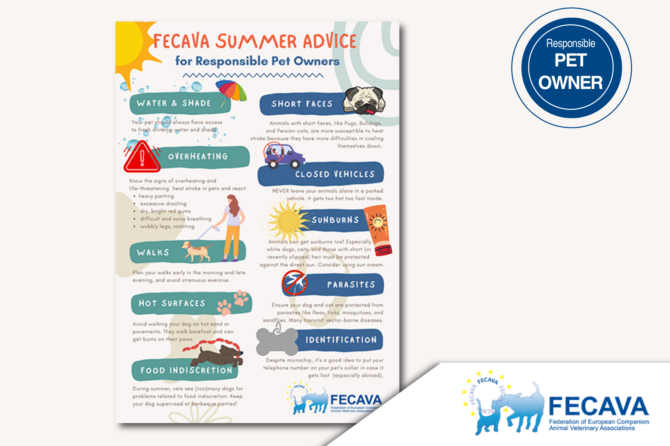
New Infographic: FECAVA Summer Advice for Responsible Pet Owners
At FECAVA, we prioritize the well-being of your beloved pets. As the summer season embraces Europe with rising temperatures, it becomes crucial to ensure the safety and comfort of our furry companions. In light of this, we have compiled a collection of valuable tips from a veterinary standpoint designed to guide you in safeguarding your pet’s health throughout the summer months.
- WATER & SHADE
Your pet should always have access to fresh drinking water and shade. - OVERHEATING
Know the signs of overheating and
life-threatening heat stroke in pets and react to:
• heavy panting
• excessive drooling
• dry, bright red gums
• difficult and noisy breathing
• wobbly legs, vomiting - WALKS
Plan your walks early in the morning and late evening, and avoid strenuous exercise. - HOT SURFACES
Avoid walking your dog on hot sand or pavements. They walk barefoot and can get burns on their paws. - FOOD INDISCRETION
During summer, vets see (too)many dogs for problems related to food indiscretion. Keep your dog supervised at barbeque parties! - SHORT FACES
Animals with short faces, like Pugs, Bulldogs, and Persian cats, are more susceptible to heat stroke. They have more difficulties in cooling themselves down. - CLOSED VEHICLES
NEVER leave your animals alone in a parked vehicle. It gets too hot too fast inside. - SUNBURNS
Animals can get sunburns too! Especially white dogs, cats, and those with short (or recently clipped) hair must be protected against the direct sun.
Consider using sun cream. - PARASITES
Ensure your dog and cat are protected from parasites like fleas, ticks, mosquitoes, and sandflies. Many transmit vector-borne diseases. - IDENTIFICATION
Despite microchip, it’s a good idea to put your telephone number on your pet’s collar in case it gets lost (especially abroad).
Download the infographic in English • Flemish • Greek • Montenegrin • Slovenian • Polish
Leave a reply

The interconnectedness of avian nutritional habits and ecosystem wellness highlights the delicate harmony that exists in nature. Human attempts to provide appropriate <a href="https://www.magnoliabirdfarms.com/">food for birds</a>, whether through well-placed feeders or conservation initiatives, subscribe to the entire well-being of ecosystems.Conversely, spring and summertime bring forth an abundance of bugs, fruits, and nectar, allowing birds to diversify their diets.
ReplyThe interconnectedness of avian nutritional habits and ecosystem wellness highlights the delicate harmony that exists in nature. Human attempts to provide appropriate chicken food, whether through well-placed feeders or conservation initiatives, subscribe to the entire well-being of ecosystems.Conversely, spring and summertime bring forth an abundance of bugs, fruits, and nectar, allowing birds to diversify their diets.
ReplyIt’s essential to note that various parrot species may have certain nutritional needs. As an example, bigger chickens such as for instance macaws may possibly take advantage of more significant quantities of nuts and fortified pellets, while smaller species like budgies may possibly require a diet with smaller, easily feasible pieces. Exploring and understanding the precise requirements of your parrot’s species might help custom their diet for optimal health.
ReplyI am very much pleased with the contents you have mentioned. I wanted to thank you for this great article.
ReplyMany homework on the continual hunt along with offstage on the road to winning. Definitely not attached, simple to-fall as a result of wayside; And not investigation, afterward into a path travel toward the black.
ReplyI want you to thank for your time of this wonderful read!!! I definitely enjoy every little bit of it and I have you bookmarked to check out new stuff of your blog a must read blog
Reply